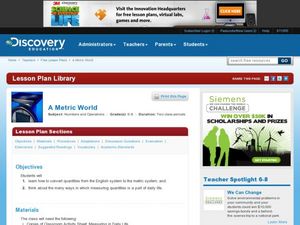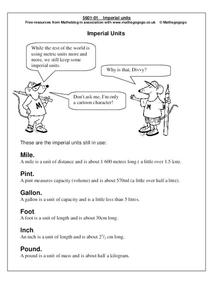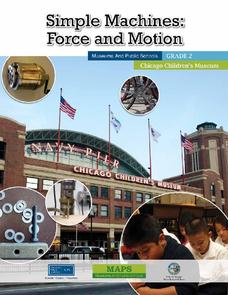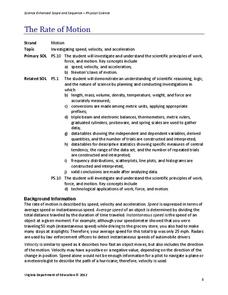Curated OER
Discovering Pi
Fourth graders are introduced and experiment with the concept of pi. Using this information, they discover the relationship between the circumference and diameter of circles. In groups, they practice measuring the circumference of...
Curated OER
Penny's Box
Students need to be able to calculate the volume and surface area of a cuboid as well as present a systematic list of results in order to justify the minimum case. The use of three factors of 100 is also important.
Curated OER
Pi Mathematics
Young scholars will measure common everyday objects in order to calculate pi. In this measurement lesson plan, students measure the circumference and diameters of objects and fill them into a chart which helps them calculate pi.
Curated OER
A Metric World
Learners convert English to metric units. In this math lesson, students give examples of measurements they encounter in their daily lives. The share their answers in class.
Curated OER
You Can Count on Squares!
Fourth graders engage in and explore to develop mathematical, specifically algebraic, ideas. Although the tasks are built around measurement, they are algebraic to the extent that they require 'formulae' to be derived form the geometric...
Curated OER
Ping Pong Vocabulary
Students estimate the size of a sea turtle nest, or clutch, that contains about 120 eggs. They decide what type of container that they are familiar with that could hold a complete nest or clutch. Finally, students calculate the volume...
Curated OER
Capturing the Wind
Students collect and analyze data about wind speed. They build a Lego wind sail and measure the wind speed with a rotation sensor. They use software to analyze the data.
Curated OER
The Chicken Run
Fourth graders work in a group of 4 to make rectangle with a 12m length of string. They discuss its perimeter and how they would calculate its area. Then another group of 4 make another rectangle and estimate if the area would be greater...
Curated OER
BYAH Word Search Puzzle
For this math worksheet, learners look for the words in the puzzle that are related to the theme of measurement. Spelling skills are worked on.
Curated OER
It's About Time!
Students examine concept of time, and explore difference between analog and digital clocks; students make art project to represent time and create a time-story problem and solution.
Curated OER
Tiling Tessellations
Students explore tessellations. In this shapes and geometry instructional activity, students describe the attributes of many of the shapes displayed on an Elmo. Students create examples of tessellations using pattern blocks.
Virginia Department of Education
The Particle Theory of Matter
Demonstrate the particle theory of matter to high school scientists with an engaging experiment that allows them to visually see the results as substances change from one state to another. The class concludes with a discussion about how...
Curated OER
Imperial Units
In this imperial units worksheet, students read the definitions to the following list of imperial units: mile, pint, gallon, foot, inch and pound.
Curated OER
Math: Equal Area Triangles
Students examine a math worksheet and determine how to divide a single triangle into four of equal area. Using geometric principles, they sketch two additional ways to divide into into four equal triangles. To conclude, students...
Curated OER
Busted Bubbles
Using the scientific method, and bubble gum, learners conduct a motivating experiment. After conducting a series of tests involving bubble gum, they graph and analyze their results. This is the type of activity everyone loves.
PBS
Arguing over Area
With the help of the Area Officers and Perimeter Patrol, you learners will develop a better understanding of area and its relationship to perimeter. First, they view a video clip from Cyberchase, and then they visit a website to test...
Chicago Children's Museum
Simple Machines: Force and Motion
Get things moving with this elementary science unit on simple machines. Through a series of nine lessons including teacher demonstrations, hands-on activities, and science experiments, young scientists learn about forces, motion, and...
Virginia Department of Education
The Rate of Motion
How much time does it take to jump over three balloons? Pupils calculate the speed of tasks that require different motions. They determine motions for tasks such as walking, skipping, hopping, and jumping before creating a spreadsheet...
National Nanotechnology Infrastructure Network
The Micro and Macro World Around Us
Don't let your eyes play tricks on you ... use scale to keep your eyes in check! Young scholars observe images without scale and try to identify the structure. Then, they look at the same image with a scale bar and assess whether their...
Curated OER
Classroom Archaeology
Students, in groups, receive a box of artifacts. They record their findings and discuss what the items would have been used for. They come together at the end of the lesson to share their findings.
Virginia Department of Education
Weather Patterns and Seasonal Changes
Get your class outside to observe their surroundings with a lesson highlighting weather patterns and seasonal changes. First, learners take a weather walk to survey how the weather affects animals, people, plants, and trees during...
Virginia Department of Education
Heat and Thermal Energy Transfer
How does radiation affect our daily lives? Answer that question and others with a lesson that discusses radiation and its use in thermal energy transfer through electromagnetic waves. Pupils investigate vaporization and evaporation while...
Virginia Department of Education
Work and Power
Assist your class with correctly calculating the values for force, work, and power as they determine the amount various activities require. They gather data and participate in a group discussion to compare results upon conclusion of the...
Virginia Department of Education
States and Forms of Energy
Energy is just energy, right? Explain various forms of energy to your young scientists by using an interactive experiment that contains common objects to demonstrate complex concepts. Pupils conduct experiments for radiant, thermal,...

























